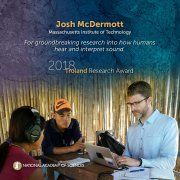The National Academy of Sciences (NAS) awards two Troland Research Awards, in the amount of $75,000, annually to recognize "unusual achievement by young investigators (defined as no older than 40) and to further empirical research within the broad spectrum of experimental psychology." These awards will be presented on April 29, 2018 during the Academy's 155th annual meeting.
NAS has named Prof. Josh McDermott as one of the 2018 Troland Research Award receipients in recognition of his "groundbreaking discoveries about how people hear and interpret information from sound in order to make sense of the world around them."
Excerpt from NAS award announcement: "A cognitive scientist, McDermott’s work operates at the intersection of psychology, neuroscience, and engineering. His laboratory conducts behavioral experiments, computational analysis of sound information, and neural investigations into the brain basis of auditory processing.
McDermott pioneered the study of sound texture by introducing the idea of statistical representations of sound. He recently conducted the first large-scale statistical analysis of reverberation, revealing that human listeners use regularities of reverb in order to separate the acoustic effects of environmental reflections from those of objects that cause sound.
McDermott’s research has also shed new light on the perception of pitch, suggesting that there are multiple brain systems for extracting pitch from sound, and on the perception of music, using fieldwork in remote cultures to reveal cross-cultural similarities and differences in how humans hear musical sounds.
McDermott is also investigating the functional organization and representational structure of human auditory cortex, developing sophisticated new methods for neuroimaging data analysis and stimulus generation. This has revealed distinct brain regions involved in analyzing speech and music, respectively.
In addition to energizing the field of human audition, McDermott’s research has the potential to improve treatment for people with impaired hearing and to enable to design of machine systems that mirror human abilities to interpret sound."

